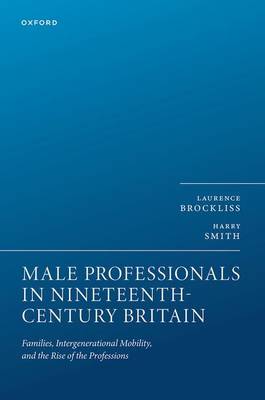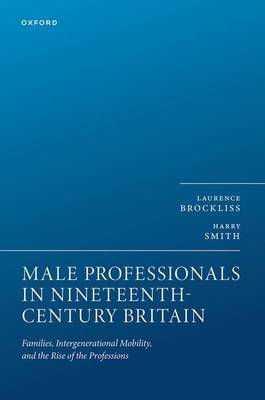
Door een staking bij bpost kan je online bestelling op dit moment iets langer onderweg zijn dan voorzien. Dringend iets nodig? Onze winkels ontvangen jou met open armen!
- Afhalen na 1 uur in een winkel met voorraad
- Gratis thuislevering in België vanaf € 30
- Ruim aanbod met 7 miljoen producten
Door een staking bij bpost kan je online bestelling op dit moment iets langer onderweg zijn dan voorzien. Dringend iets nodig? Onze winkels ontvangen jou met open armen!
- Afhalen na 1 uur in een winkel met voorraad
- Gratis thuislevering in België vanaf € 30
- Ruim aanbod met 7 miljoen producten
Zoeken
Male Professionals in Nineteenth Century Britain
Families, Intergenerational Mobility, and the Rise of the Professions
Laurence Brockliss, Harry Smith
Hardcover | Engels
€ 273,95
+ 547 punten
Omschrijving
Male Professionals in Nineteenth-Century Britain is the first statistically-based social, cultural and familial history of a fast-growing and socially prominent section of the Victorian propertied classes. It is built around a representative cohort of 750 men who were recorded in the 1851 census as practising a profession in eight British provincial towns with distinctive economic and social profiles: Brighton, Bristol, Dundee, Greenock, Leeds, Merthyr Tydfil, Winchester, and the twin county town of Northumberland, Alnwick/Morpeth. The book provides a collective account of the cohort's lives and the lives of their families across four generations, starting with their parents and ending with their grandchildren. It touches on the history of 16,000 individuals. The book aims to throw light on the extent to which nineteenth-century professionals had a distinctive socio-cultural profile, as sociologists and some historians have claimed, or were largely indistinguishable from other members of propertied society, as most historians today assume without further investigation. In exploring this question, particular attention is paid to the cohort families' wealth, household size, education, occupational history, geographical mobility, and broader involvement in society measured by their members' choice of marriage partner, their kinship and friendship circles, their political allegiance and their leisure activities. The book demonstrates that male professionals in the Victorian era were far from being a homogenous group, but were divided in many ways. The most important was wealth which played a key role in the social and occupational fortunes of their descendants. These divisions largely explain why some professionals and some individual professions were much more likely to display endogenous characteristics than others. The book also demonstrates that even the most successful professional families got poorer over time, and reveals how easily in the age of industrialisation branches of families and sometimes complete families could drop out of the elite.
Specificaties
Betrokkenen
- Auteur(s):
- Uitgeverij:
Inhoud
- Aantal bladzijden:
- 544
- Taal:
- Engels
Eigenschappen
- Productcode (EAN):
- 9780198897552
- Verschijningsdatum:
- 27/09/2024
- Uitvoering:
- Hardcover
- Formaat:
- Genaaid
- Afmetingen:
- 150 mm x 224 mm
- Gewicht:
- 952 g

Alleen bij Standaard Boekhandel
+ 547 punten op je klantenkaart van Standaard Boekhandel
Beoordelingen
We publiceren alleen reviews die voldoen aan de voorwaarden voor reviews. Bekijk onze voorwaarden voor reviews.











